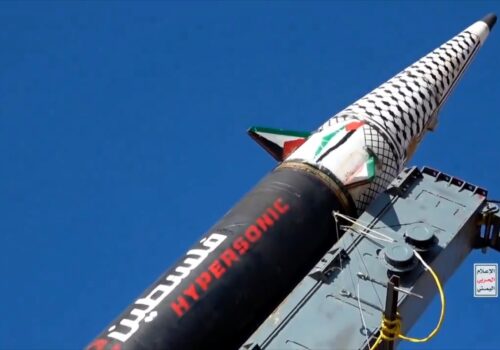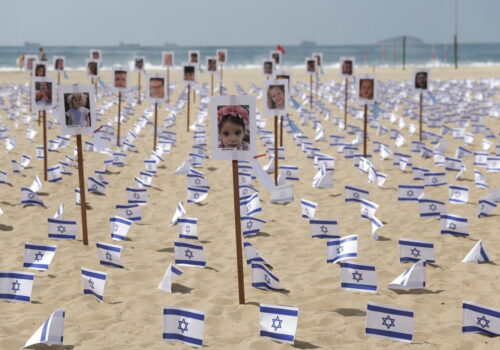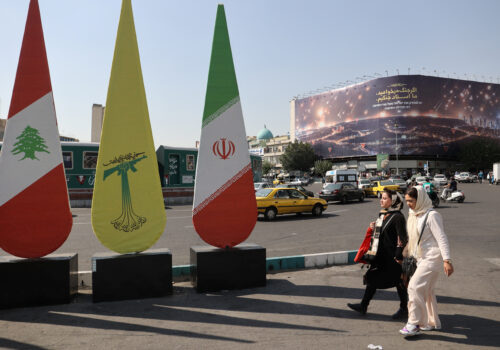How the death of Abdul Malik al-Houthi could impact the Houthis and Iran
On September 29, rumors began circulating on social media that a helicopter carrying leaders from the Islamic Revolutionary Guard Corps (IRGC) and the Yemen-based Houthis crashed in southwestern Iran. The crash reportedly killed several high-ranking IRGC members and Houthi leaders, including the head of coordination for the Houthis, Mohammed Abdul-Salam, and Houthi commander Abdul Malik al-Houthi.
Analysts, however, quickly refuted these claims, citing that Iranian state media had reported nothing to suggest these rumors were true. Houthi later proved he was alive and well when the commander made a video address on the anniversary of the October 7, 2023, the date of Hamas’s attack on Israel. While Houthi is still alive today, his death in the near term would impact the group’s ability to operate and widen a leadership vacuum within Iran’s Resistance Axis.
SIGN UP FOR THIS WEEK IN THE MIDEAST NEWSLETTER
Following his ascension to the role of the Houthis’ military commander in 2004 and the death of his brother Hussein Badr-al-Din al-Houthi, Houthi has made himself indispensable to the rebels. His vitalness was reinforced in 2010 when he replaced his father, Badr-al-Din al-Houthi, as the group’s religious and political leader. Since bringing the organization under his complete control, Houthi has successfully transformed what was once known as a “rag-tag militia” into a military organization that controls a significant portion of Yemeni territory and is capable of threatening regional powers and disrupting maritime traffic in the Red Sea, Bab el-Mandeb Strait, and the Gulf of Aden. Since the Houthis’ attacks began last year, traffic through the Suez Canal has reportedly dropped 66 percent. Despite this drop and evidence of Washington’s waning influence, Chinese vessels have increased their transit in the strategic waterways, due to their favorability with Iran and the Houthis.
Exploiting the security vacuum left by the United States in the region, Houthi has proven his utility to his backers in Tehran by launching unprecedented attacks on Israeli territory and international shipping while simultaneously withstanding airstrikes from the United States, the United Kingdom, and Israel. In September, the Houthis launched a surface-to-surface ballistic missile that traveled over 1,200 miles into Tel Aviv, and multiple US Navy destroyers were subject to a “complex attack” of cruise missiles and unmanned aerial vehicles (UAVs) in the Red Sea. These efforts have significantly raised the group’s international profile, which has given them leverage ahead of peace negotiations with Saudi Arabia and positioned them to take on a more central role in the IRGC’s revolutionary strategies.
The critical role that Houthi continues to play both in Yemen and within Iran’s network of allies and proxies could make him a target for Israel, a fear almost certain to be heightened given the recent deaths of Hezbollah Secretary General Hassan Nasrallah and Hamas leader Yahya Sinwar.
But regardless of the proximate cause of Houthi’s demise, his death would not mean a swift end to the Houthis altogether: It would instead usher in a period of uncertainty for the organization that could require them to shift their focus away from operations beyond Yemen’s borders. And if the next Houthi leader falls short of his predecessor, it could lead to a loss of morale and support from Houthi fighters, as well as the estimated two-thirds of Yemen’s population living under the group’s control. With an approximate overall population of over 32 million people, the majority of whom are in need of humanitarian assistance, the ability to successfully govern the local populace remains tenuous but is imperative to maintain power.
Since Houthi’s charisma and complete leadership inside the group have led to the Houthis’ rapid rise on the world stage, replacing him will prove challenging. While his younger brother Abdelkhaleq al-Houthi appears to be the most logical replacement, given that he already acts as Houthi’s second-in-command and has led the largest Houthi military brigade since the group took control of Sanaa in 2014, he has yet to be publicly named as the successor. This ambiguity means he could be challenged by other family members, like cousins Ali Hussein al-Houthi and Mohammed Ali Abdul Kareem Ameer Al Deen al-Houthi or older half-brother Yahya Badr Al Deen al-Houthi.
But internal strife could extend beyond the Houthi family. While rarely discussed publicly, infighting between local Houthi commanders and loyalists from the northern governorates has long been an issue for the rebels. Even though the Houthi leadership structure is characterized by familial nepotism, warring parties could see Houthi’s death as an opportunity to create a rival faction or overthrow his successor and potentially alter the group’s relationship with Iran or the focus of their operations. Despite being supported by Iran for a decade with weapons and intelligence, the relationship between Sanaa and Tehran is complicated and by no means as enduring as Iran’s relationship with its other regional proxies in Lebanon or Iraq. The loss of the commander would be a blow to Iran, at least initially.
Long cautious about his safety, the Houthis are well-aware that their leader is a prime target for their enemies. Back in 2009, several years before the group had even taken control of the Yemeni capital and triggered international intervention, Yemeni media falsely reported that Houthi had been killed in an airstrike. Since then, he has lived transiently to avoid being tracked, never meets with the media, and is rarely seen in public. Iran, too, is aware of the threat, with reports on social media shortly after Nasrallah’s death claiming that Houthi, alongside Supreme Leader Ayatollah Ali Khamenei, were transferred to secure locations to avoid Israeli attacks.
Recognizing that recent high-profile Israeli intelligence operations like the communications attacks in Lebanon and the assassination of Hamas leader Ismail Haniyeh on Iranian soil have incited fear in the group, the death of Houthi would only interrupt the group’s malign activities in the short term. Long-term solutions like preventing Iran from resupplying the militant group and equipping the internationally recognized government are necessary to truly address the Houthi threat in the region and beyond.
Emily Milliken is the associate director of the Atlantic Council’s N7 Initiative.
Caitlin Miller Hollingsworth is the vice president and general counsel at the Fozzie Miller Group.
Further reading
Tue, Sep 24, 2024
Do the Houthis really have a hypersonic missile?
MENASource By Emily Milliken
The claim is concerning for more than just the high speeds; Hypersonic missiles are difficult for missile-defense systems to intercept.
Fri, Oct 4, 2024
One year after Hamas’s October 7 terrorist attacks, here’s how the region has changed
MENASource By
One year on, the Gaza War remains unresolved and the potential for war across the region is becoming more likely. Atlantic Council experts take on questions about the war's impact—and its future.
Fri, Oct 11, 2024
The Nasrallah killing is upending Iran’s security strategy. Here’s what to expect next.
IranSource By Danny Citrinowicz
Tehran needs to decide whether it is ready to change its policy since October 7, 2023.
Image: A Houthi follower wears a vest portraying the Houthi leader Abdul-Malik al-Houthi during a parade held as part of a 'popular army' mobilization campaign by the movement, in Sanaa, Yemen February 7, 2024. REUTERS/Khaled Abdullah


